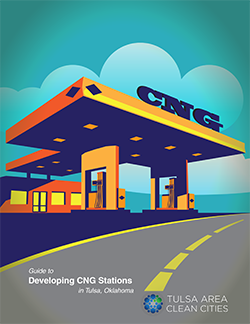This guide is intended for developed of compressed natural gas fueling stations within the City of Tulsa. Interested in creating a guide for your city? Contact us and we’ll help.
Download the print version or read below.
CNG fueling stations in Oklahoma are regulated by the Oklahoma Department of Labor. Stations within Tulsa must be installed in accordance with City of Tulsa ordinances and manufacturer instructions. The following are permitting, review and inspection requirements for CNG fueling stations.
►Considerations Before Buying Land
►Codes
►State Statutes
►Required Certifications
►Permits & Inspections
►Help
Considerations Before Buying Land
Gas Supply
Call the natural gas utility, ONE Gas, to determine if adequate gas supply and infrastructure is available at your proposed fueling station location. Pressures in Tulsa are generally low, so it is critical to contact the utility to make those determinations early on.
Emily Reh, CNG Business Development Manager / email / 918.947.7134
Electricity
Electrical power is a major factor in CNG station development because of the heavy loads required by compressors and dryers. Engage with the electric utility, AEP-PSO, early on to strategize peak load timing and pricing, and to determine if they can supply the amount of power required to operate the station.
Call 888.216.3523. Press ‘5’ and ask for Engineering. Describe your project needs and potential location.
Zoning & Land Use
Refer to the City of Tulsa Zoning Map to see if the parcel’s current zoning allows fueling stations. Alternative fuel fueling stations are treated in the same manner as traditional fueling stations (City of Tulsa Zoning Code 35.050-Q.1 and 35.050-Q.3).
Fueling stations are permitted in the following zoning districts:
CS, CG, CH, CBD, IL, IM, IH, MX2, MX3, IMX
Setbacks
In addition to setbacks established by national codes, facilities must also meet requirements as outlined in the City of Tulsa Zoning Code, specific to the zoning district of the property.
Parking
Fueling stations are also subject to minimum parking requirements set forth in Chapter 55.020 of the City of Tulsa Zoning Code. Required parking varies between zoning districts and uses, and is based on square footage.
Unstaffed locations with no retail component are not required to provide parking. Fueling stations with retail components are required to provide at least the following parking spaces:
CBD: No minimum requirements
CH, MX districts: 1.50 parking spaces per 1,000 square feet
All other districts: 1.80 parking spaces per 1,000 square feet
Landscaping, Screening, Lighting and Signage
Developments must meet all landscaping, screening and lighting requirements found in Chapter 65 of the Zoning Code, plus signage requirements as detailed in Chapter 60.
Comprehensive Plan & Land Use
The fueling station must also comply with the City of Tulsa’s Comprehensive Plan, Land Use Designations, Stability & Growth Designations, and any Small Area Plans that apply.
For more information on Zoning & Land Use, contact INCOG or the City of Tulsa Planning Department.
Codes
Regarding CNG fueling stations, the City of Tulsa utilizes International Building Code and International Fire Code, while the State of Oklahoma has adopted National Fire Protection Association (NFPA) 52-2013. The two codes sometimes conflict and contradict the other.
Ultimately, the local authority having jurisdiction will be the final determining factor in the station’s development. As such, it is critical for developers to engage with the Fire Marshal ( 918.596.9422 ) and Building Permit Officials (see Permits & Inspections below) as early as possible to ensure all parties have mutual expectations well before permits are requested.
For general information on codes, view the City of Tulsa’s Codes, Ordinances and Standards Guide.
State Statutes
§17-306 Oklahoma Storage Tank Regulation Act
§68-2357.22 Oklahoma Revenue and Taxation-Tax Code-Income Tax
Oklahoma Administrative Code (Rules) OAC 380:80, OAC 580:55-1-21, OAC 580:55-9-1
§40-142.1 Alternative Fuels Technician Certification Act
Required Certifications
Anyone installing, services, modifies, repairs or renovates fill stations must obtain certification by the Oklahoma Department of Labor’s Alternative Fuels Division.
⚠ Important! If you are working with a station builder, ensure that they have all required certifications and licenses. If you are doing the work yourself, contact ODOL about certification requirements.
Ruth Neville, Programs Officer / 405.521.6594 / email
Robert Lassiter, Compliance Officer / 405.521.6855 / email
John Melson, Compliance Officer / 405.985.5358 / email
Permits & Inspections
Call the City of Tulsa’s Permit Center at 918.596.9601 with building permit questions, or view the Commercial Construction Permit Procedure Guide. The Permit Center is located in Downtown Tulsa at City Hall, 175 E 2nd St., Suite 455, Tulsa, Ok 74103.
You must submit the following to the Oklahoma Department of Labor at least 30 days prior to construction to obtain an ODOL permit:
• Form AF-1 (Alternative Fuels Permit Application);
• a plat drawing from the appropriate appraisal district identifying the facility’s property boundaries;
• and a site plan that meets ODOL requirements.
After permits are issued, inspections are required by the City of Tulsa and Department of Labor.
For general information on City of Tulsa inspections, call 918.596.9656 or visit their website.
To request an inspection by the City of Tulsa, first view the inspections guide, then call 918.596.1720 to schedule the inspection.
Help
If you need help navigating the process, call Tulsa Area Clean Cities (TACC) at 918.579.9494 or send us an email. TACC is a resource for alternative fuels in the Tulsa area and can help guide you through the development of your CNG fueling station.
